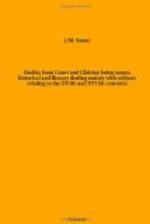* P. 23, edited by the Camden Society.
** Sir George Croke’s Reports, edited by Thomas Leach, ii. 91. London, 1790-92.
Matthias Flach-Franconitz, better known as Flacius Illyricus, from the place of his birth (in Istria, a part of Illyria) was a voluminous writer on most of the controverted doctrines in the sixteenth century. Having become a disciple of Luther he was for ever raising fresh disputes on religious subjects, and was noted for the violence and exaggeration he brought into their discussion, so that, according to a German historian, “he seemed to have been created for an ecclesiastical Procurator General.” On his death in 1575, Jacques Andreas, one of his friends, admitted that, taken altogether, his Illyricus was the devil’s Illyricus, and that, in the opinion of Andreas, he was then “supping with devils."*
* Hoefer, Nouvelle Biogaphie Generale, Art, Flach-Franconitz Matthias.
Such then being Foxe’s authority, although unacknowledged, for his Waldensian chapter, we can scarcely expect him to be more conscientious in his evidence concerning matters closely connected with the passions, prejudices, and burning questions of his own day.
Nearly, if not quite all the material for that part of the Acts and Monuments which deals with the reign of Mary was collected by others for Foxe and Grindal during their absence from England. Grindal handed over to Foxe the accounts of the various prosecutions for heresy sent to him by his correspondents at home, taking care, however, at the same time to warn the martyrologist against placing too much confidence in them, he himself suspending his judgment “till more satisfactory evidence came from good hands.” He advised him for the present, only to print separately the acts of particular persons of whom they had authentic accounts and to wait for a larger and more complete history until they had trustworthy information concerning the “martyrs."* The letters, which Grindal wrote to Foxe on this subject in 1557, were published by the Parker Society, in Grindal’s Remains, and show that the future archbishop believed not too implicitly in the truth of all the stories which he passed on to his friend. He constantly urged him to delay writing in order to gain “more certain intelligence.”




